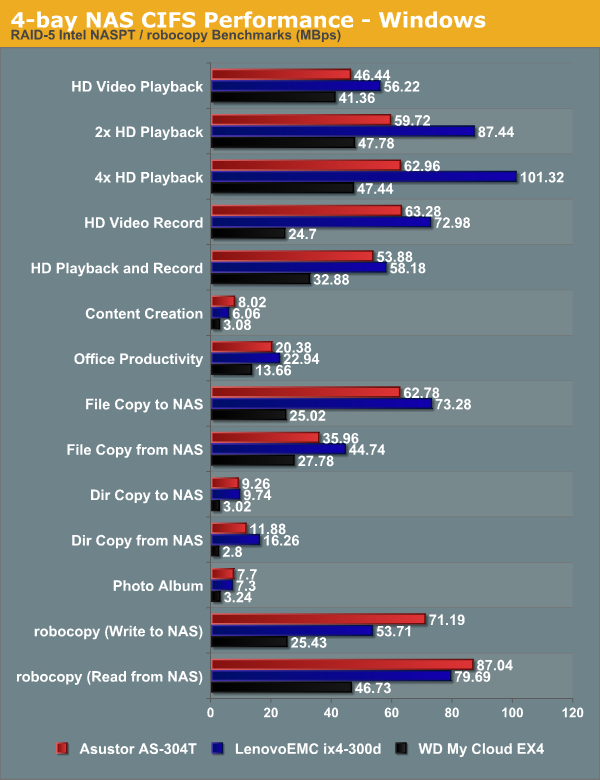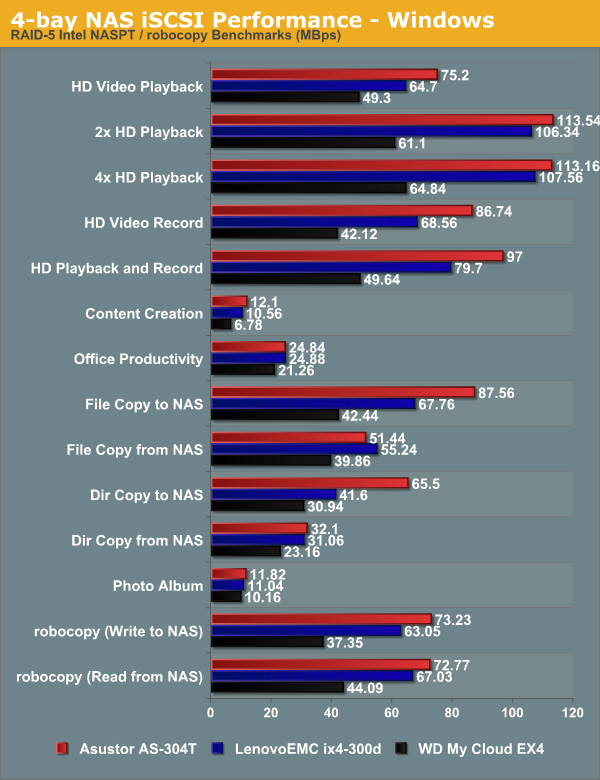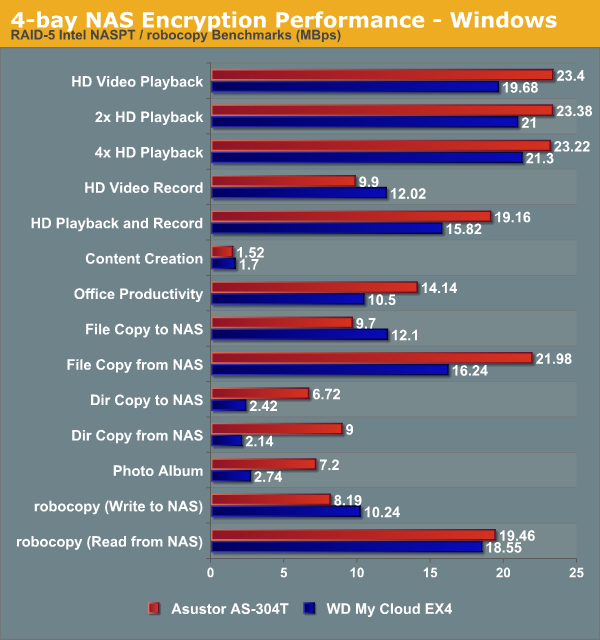Asustor AS-304T: 4-Bay Intel Evansport NAS Review
by Ganesh T S on March 26, 2014 11:15 AM ESTSingle Client Performance - CIFS & iSCSI On Windows
The single client CIFS performance of the Asustor AS-304T was evaluated on the Windows platforms using Intel NASPT and our standard robocopy benchmark. This was run from one of the virtual machines in our NAS testbed. All data for the robocopy benchmark on the client side was put in a RAM disk (created using OSFMount) to ensure that the client's storage system shortcomings wouldn't affect the benchmark results. It must be noted that all the shares / iSCSI LUNs are created in a RAID-5 volume.

The above numbers present some interesting results. The ARMADA XP-based ix4-300d manages to beat the AS-304T in multiple workloads. Based on the above graph alone, it might appear as if the ix4-300d is much better, but the AS-304T manages to take the lead in certain common workloads as well as feature set (hot-swap capability, for instance).
We created a 250 GB iSCSI target and mapped it on the Windows VM. The same benchmarks were run and the results are presented below. The x86-based AS-304T handily beats the other 4-bay NAS units that we have evaluated (all of which are ARM-based).

Encryption Support Evaluation
Consumers looking for encryption capabilities can opt to encrypt a iSCSI share with TrueCrypt or some in-built encryption mechanism in the client OS. However, if requirements dictate that the data must be shared across multiple users / computers, relying on encryption in the NAS is the best way to move forward. Most NAS vendors use the industry-standard 256-bit AES encryption algorithm. One approach is to encrypt only a particular shared folder while the other approach is to encrypt the full volume. Asustor supports only folder-level encryption in ADM.
On the hardware side, encryption support can be in the form of specialized hardware blocks in the SoC (common in ARM / PowerPC based NAS units). In x86-based systems, accelerated encryption support is dependent on whether the AES-NI instruction is available on the host CPU. The Atom CPU in the Evansport SoC doesn't support AES-NI, but the SoC does have a security engine. Unfortunately, Asustor's firmware doesn't take advantage of the security engine's APIs. The encryption is done using the host CPU and the performance is hit heavily. We enabled encryption on a a CIFS share to repeat our Intel NASPT / robocopy benchmarks. The results are presented in the graph below

Enabling encryption pulls down the performance numbers, most times by more than 50%. In terms of raw numbers, the performance is sometimes even worse than what can be obtained from ARM-based 4-bay units. If encryption is important, it might be better to wait for the next generation of Atom-based NAS units (the new Atom CPUs have AES-NI) or opt for a higher-end unit sporting a CPU with AES-NI capabilities.










34 Comments
View All Comments
EricZBA - Wednesday, March 26, 2014 - link
Can you install Plex on this unit?ganeshts - Wednesday, March 26, 2014 - link
Yes, available in App Central: http://www.asustor.com/apps/app_detail?id=142However, like most platforms, there is no hardware accelerated transcode using Plex
imaheadcase - Sunday, March 30, 2014 - link
Isn't the 1gig of memory hard on apps though? Couchpotato/sickbeard/SABzbd would be a bad idea even if its available since they run as a service. Or am I thinking this wrong.,LordConrad - Wednesday, March 26, 2014 - link
The hardware specs on these Home/SOHO NAS units are rather anemic. I built my own a couple years ago based on an i3-2120, 8GB RAM, and NAS4free. Much better performance than any Atom-based NAS unit.Beany2013 - Wednesday, March 26, 2014 - link
I used to agree with you, but I picked up a Synology DS214+ recently and realised that these days, if you just want to be able to saturate a gigabit link when shuffling files, and stream media (with the exception of hardware transcoding to non-PC devices, natch) then something like 'this' is a much, much easier path.Especially as I build/fix/generally look after servers and general IT stuff for a living - last thing I want to be doing when I get home is build *another* RAID array...
It's getting to the stage where these devices are good enough for most of us - IE power users - and only edge cases (such as transcoded streaming) really need a dedicated, self-built server.
Not arguing!
Steven R
manmax - Wednesday, March 26, 2014 - link
What if the device decides to quit working and you're using RAID. You may not be able to recover your data by putting the drives in another server. Especially if the original NAS is using hardware RAID.Zak - Thursday, March 27, 2014 - link
Well, you still need to have a backup.ganeshts - Thursday, March 27, 2014 - link
Most of these COTS NAS units (Synology / QNAP / Asustor etc.) don't use hardware RAID. Just take off the drives, plug them into a PC, make images and mount them. Linux systems can auto-recognize these RAID volumes. If using Windows, use something like UFS Explorer to get your data off it. That is the reason I like software RAID more than hardware RAID.CalaverasGrande - Friday, March 28, 2014 - link
I completely agree. I could really blow the doors off of a NAS custom build. But when I get home after a 12 hour day of Raid rebuilds, Backup restores and email issues, the last thin I want to do is build a boring little Linux storage box.My next NAS will eitehr be Synology or Qnap. Good balance of features, performance and most relevantly, a MATURE OS and firmware.
Heck I may even throw performance out the window and pick up one of the hated DROBO NAS products. They aren't the fastest, and their 'beyondraid' is proprietary. But when I've used their products in professional environs they were easy to set up and worked. Albeit slooooowly.
Besides, I've yet to meet a raid array level 5 or hhigher that can be migrated between devices without backing it up and restoring it to the "new" raid.
Gigaplex - Saturday, March 29, 2014 - link
Software RAID on Linux is portable between devices.